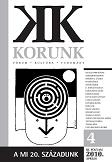Egy évszázad kisebbségben
A Century Spent as Minority: Hungarians in Twentieth-Century Central and Eastern European Nation-States
Author(s): László SzarkaSubject(s): History
Published by: Korunk Baráti Társaság
Keywords: Hungarians; the Treaty of Trianon; nation-building; external homeland
Summary/Abstract: Within the boundaries of the Central and Eastern European nation-states established by the Treaty of Trianon, minorities have lived under various legal, political and economical circumstances. This study examines the nation-building processes of Hungarian minority communities in the neighbouring countries of Hungary between 1918–1920. The author traces a comparison of the ethnopolitical conditions offered by states in this region during the interbellum and in the period of the communist party-state. Although there existed strong ties between the self-interpretation of the minorities and the state of Hungary, which assumed the role of the external homeland, the pragmatic political practice of the minorities and the revisionist politics of the Hungarian governments also differed in many ways. The Hungarian minority communities in Romania, Czechoslovakia and Yugoslavia conducted important clarifying debates about their possible roles, political agendas and duties as a community. The ideology of Transylvanism emphasized the cooperation of nations living in Transylvania, while the couleur locale theory from Wojwodina accentuated the importance of regional characteristics, as well as the mediating function of a bridge for the minorities. The revisionist changes associated with World War II, and then the Paris Peace Treaty from 1947 burdened the relationships between the majority nations and the Hungarians even more. Then, for four decades, the communist party-state regimes of the Soviet block rendered impossible the efficient treatment of the minority problem.
Journal: Korunk
- Issue Year: 2010
- Issue No: 04
- Page Range: 59-76
- Page Count: 18
- Language: Hungarian

